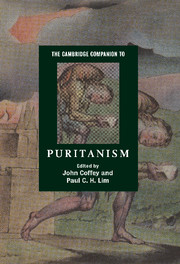Book contents
- Frontmatter
- Introduction
- Part I: English Puritanism
- Part II: Beyond England
- Part III: Major Themes
- 11 Practical divinity and spirituality
- 12 Puritan polemical divinity and doctrinal controversy
- 13 Puritans and the Church of England: historiography and ecclesiology
- 14 Radical Puritanism, c. 1558-1660
- 15 Puritan millenarianism in old and New England
- 16 The godly and popular culture
- 17 Puritanism and gender
- 18 Puritanism and literature
- Part IV: Puritanism and posterity
- Index
12 - Puritan polemical divinity and doctrinal controversy
from Part III: - Major Themes
Published online by Cambridge University Press: 28 November 2008
- Frontmatter
- Introduction
- Part I: English Puritanism
- Part II: Beyond England
- Part III: Major Themes
- 11 Practical divinity and spirituality
- 12 Puritan polemical divinity and doctrinal controversy
- 13 Puritans and the Church of England: historiography and ecclesiology
- 14 Radical Puritanism, c. 1558-1660
- 15 Puritan millenarianism in old and New England
- 16 The godly and popular culture
- 17 Puritanism and gender
- 18 Puritanism and literature
- Part IV: Puritanism and posterity
- Index
Summary
John Bunyan declared that 'it pleased me much to contend with great earnestness for the Word of faith', and he and other Puritans were not slack in doing so. The theological literature of the Protestant Reformation and its seventeenth-century aftermath (including that written by English and American Puritans) was shaped by controversy. Doctrinal differences from Roman Catholicism had to be defended, boundaries drawn among Protestant factions and Christian truth defended against gainsayers. Such theological polemic was not confined to treatises written in the heat of doctrinal debate but spilled over into catechetical, systematic, exegetical, homiletic and even devotional works. Of course theological controversy was not new in the seventeenth century: Pauline and other New Testament letters reflected early Christian controversy, the creedal formulations of ancient Christianity were moulded by theological conflict and in the later middle ages theological polemic flourished in the new universities abetted by Aristotelian logic and dialectical speculation, producing the precision of scholasticism. Later, the theology of Renaissance Christian humanists such as Erasmus was polemical in its critique of such scholasticism. The doctrinal positions taken up and defended by Puritans were for the most part not original to them, but were rather the stock in trade of what is imprecisely designated Calvinist or more properly Reformed theology.
- Type
- Chapter
- Information
- The Cambridge Companion to Puritanism , pp. 206 - 222Publisher: Cambridge University PressPrint publication year: 2008
- 2
- Cited by

